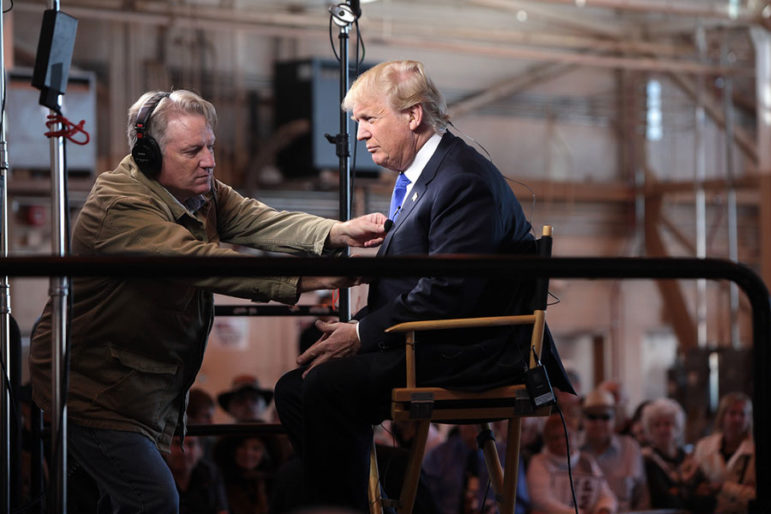
November 22, 2016; New York Times
The relationship between America’s president and its press has often been an uneasy one. From Theodore Roosevelt and the muckrakers to Fox News’ tenacious grip on the “birther” story, the last century-plus has seen regular disagreement and discord between the Fourth Estate and the head of the free world. But now, with a president-elect who attacks the nation’s media on an almost daily basis both through social media and in person in the belief it is composed of liars who are out to get him, it may be that America’s cherished freedom of the press is in danger from the very person who takes copious advantage of it.
Not content with simply airing his media grievances via Twitter, his 140-character favorite method of communicating with the people, Donald Trump is also fond of using the nation’s legal courts to settle his free-speech grudges. He and his companies have filed seven suits as libel plaintiffs (winning only one when the defendant failed to attend), leading the Media Law Resource Center to label him a “libel bully.” (So far, they have not been sued by Trump for their name-calling.)
The MLRC details the seven cases and their rulings here; each is remarkable for its pettiness. The first of those cases, in 2006, was against Tim O’Brien, then a financial reporter at the New York Times. O’Brien was the author of a book about Trump which, after interviewing sources close to Trump, concluded the businessman’s net worth was only in the hundreds of millions, not the billions Trump claimed. Trump sued, and the case was dismissed four judges and three years later.
Sign up for our free newsletters
Subscribe to NPQ's newsletters to have our top stories delivered directly to your inbox.
By signing up, you agree to our privacy policy and terms of use, and to receive messages from NPQ and our partners.
President-elect Trump has proven himself to be remarkably thin-skinned for such a self-proclaimed successful businessman and politician. His demonstrated litigious nature is often not so much concerned with winning as it is inconveniencing—or outright ruining—those he feels have slighted him. Of the O’Brien case, Trump told the Washington Post, “I spent a couple of bucks on legal fees, and they spent a whole lot more. I did it to make his life miserable, which I’m happy about.”
At a time when public trust in journalism is low and media outlets are struggling to survive falling profits, the press is more vulnerable than ever to Trump and other billionaires, who have begun to view the courts—and their wealth—as the tools with which to express their dissatisfaction with the right of free speech. A libel lawsuit used to be a bad bet. The Supreme Court’s protection of free speech has set a high standard for winning a libel suit and, up until recently, the courts ruled in favor of the press in over half of all cases. But in the last six years, the media’s winning streak has fallen to 39 percent and has included high profile cases against Mother Jones and Gawker Media, both bankrolled by Republican billionaires.
- Frank VanderSloot sued Mother Jones after it published a story about him that included his contributions to a GOP SuperPAC and his very public anti-LGBT stance. The subsequent proceedings stretched for three years and cost Mother Jones $2.5 million in legal fees. The suit was thrown out last year when the judge ruled the facts in the story were either true or protected opinion, but VanderSloot felt “absolutely vindicated” while Mother Jones turned to its readers for donations to help cover their legal fees.
- In 2007, website Gawker ran an article about PayPal founder Peter Thiel, titled “Peter Thiel Is Totally Gay, People.” In response, Thiel didn’t sue on his own behalf but paid lawyer Charles Harder a minimum of $10 million to bankroll lawsuits against the site by several other plaintiffs. Harder has filed five known suits against the website, though it is unknown how many or which ones Thiel’s money is supporting except for the one filed by wrestler Terry “Hulk Hogan” Bollea. In that case, a jury awarded Bollea $140 million in damages after Gawker published a brief video of him having sex. One juror said of the decision, “It makes an example in society and [to] other media organizations.” As a result of the settlement, Gawker’s parent company declared bankruptcy and the site folded.
Thiel said his involvement in these lawsuits was “less about revenge and more about specific deterrence”; moreover, had his involvement been made public from the beginning, it would have come across as a “billionaire trying to squash the First Amendment.” Some would argue that’s exactly what it appears to be.
Thiel has been a supporter of Donald Trump’s presidential campaign and is now a member of his transition team. It’s unclear whether he will be given a role in the Trump administration or what his influence is on the president-elect, but supporters of the First Amendment should watch Trump and his wealthy friends closely as they deal with press criticism. As Tom Socca, former Gawker editor, warned readers in August, “You live in a country where a billionaire can put a publication out of business.”—Melinda Crosby













